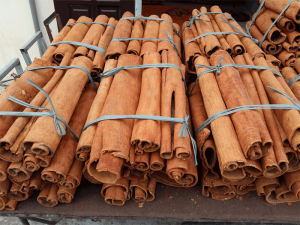
Cinnamon has long been one of the most precious and popular spices worldwide. Specifically, Vietnamese cinnamon, with its intense aroma, characteristic warm and spicy taste, and high essential oil content, has asserted its position on the international spice map.
1. Origin and Growing Regions
Vietnam is considered one of the cradles of the cinnamon tree, with a history of cultivation and use spanning thousands of years. The main cinnamon varieties in Vietnam belong to the species Cinnamomum cassia (Cassia cinnamon or Thanh cinnamon) and a smaller proportion of Cinnamomum loureiroi (Quan cinnamon).
Famous cinnamon growing regions in Vietnam are primarily concentrated in the northern mountainous provinces and some central provinces:
- Yen Bai: Renowned for Tran Yen cinnamon, considered the cinnamon capital of Vietnam with the largest area and production in the country. Yen Bai cinnamon is characterized by thick bark, a deep reddish-brown color, high essential oil content, and a rich aroma.
- Quang Ninh: With Quang Ninh cinnamon, also an ancient cinnamon growing region, producing quality cinnamon products.
- Thanh Hoa, Nghe An, Quang Nam, Quang Ngai: These provinces also contribute to Vietnam’s cinnamon output, with each region bringing unique characteristics of soil and climate, creating diversity in Vietnamese cinnamon products.

2. Special Spice and Nutritional Value
Vietnamese cinnamon is not just an ordinary spice but also a valuable medicinal herb with many health benefits.
As a spice:
- Flavor: Cinnamon offers a warm, mildly spicy, and subtly sweet, intensely aromatic flavor.
- Applications:
- Cuisine: Cinnamon is widely used in preparing savory dishes (pho, curry, braised pork, etc.) and sweet dishes (cakes, candies, teas, coffees, etc.) to enhance flavor and appeal.
- Beverages: Cinnamon tea, cinnamon coffee, and cinnamon liqueur are popular drinks, especially in cold weather.

Nutritional and medicinal value:
- Antioxidants: Cinnamon contains a high content of powerful antioxidants like polyphenols, which help protect the body from free radical damage.
- Anti-inflammatory, antibacterial: Compounds in cinnamon have anti-inflammatory and antibacterial properties, helping the body fight infections and reduce inflammation.
- Blood sugar stabilization: Some studies suggest that cinnamon can help improve insulin sensitivity and lower blood sugar levels, benefiting people with type 2 diabetes.
- Digestive support: Cinnamon has properties that stimulate digestion, reducing bloating and indigestion.
- Good for heart health: Cinnamon may help reduce bad cholesterol (LDL) and triglycerides while increasing good cholesterol (HDL), contributing to heart health.
3. Products from Cinnamon
From raw cinnamon, many diverse products are processed to meet different market needs:
- Cinnamon sticks (cinnamon bark): The most common product, rolled or cut into pieces, used directly as a spice or for decoration.
- Cinnamon powder: Finely ground cinnamon sticks, convenient for preparing various dishes and beverages.
- Cinnamon essential oil: Extracted from cinnamon bark, leaves, and branches, it has a strong aroma and numerous applications in traditional medicine, cosmetics, and flavorings.
- Cinnamon tea: Tea bags or dried cinnamon slices used for brewing tea.
- Cinnamon incense sticks: Handicraft products made from cinnamon powder, with a pleasant fragrance, used for worship or relaxation.
- Handicrafts: From cinnamon wood and bark, crafted into decorative items and souvenirs.
4. Export Market
Vietnam is one of the world’s largest cinnamon exporters. Vietnamese cinnamon is present in many demanding markets, such as:
- India: The largest importer of Vietnamese cinnamon, with high demand for cinnamon in traditional dishes and Ayurvedic medicine.
- United States: Demand for organic and high-quality cinnamon is increasing.
- European countries (Germany, France, Netherlands, etc.): Vietnamese cinnamon is used in the food, beverage, and pharmaceutical industries.
- Other Asian countries (Japan, South Korea, China): Stable demand for cinnamon as a spice and medicinal ingredient.
With its superior quality and diverse value, Vietnamese cinnamon is not just an agricultural product but also a symbol of traditional flavor and sustainable economic development potential. Maintaining and developing cinnamon growing regions, enhancing product quality, and expanding export markets will continue to affirm the position of Vietnamese cinnamon on the international stage.
Other articles:
Other agricultural products:


